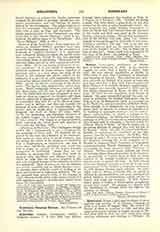

Bicknor, ALEXANDER, Archbishop of Dublin, date of birth unknown; d. 1349. As his surname suggests he came from a family of Kent, England. He was elected Archbishop of Dublin in 1310, being at that time Prebendary of Maynooth and Treasurer of Ireland. This selection was, however, set aside by Edward II in favor of Lech who soon died; after this, in May, 1314, Edward petitioned Pope Clement V to confirm Bicknor’s appointment. The request was earnestly repeated in 1317, and he was finally consecrated in Rome, July 22 of this year. In 1318 he was appointed Lord Justice of Ireland. On some unrecorded ground his name appears as attending the English Parliament, and he took part on September 24, 1318, in promulgating at St. Paul’s the excommunication of Robert Bruce. Even though, as a diplomatist, he was frequently absent from his diocese, he showed his interest in it by building an episcopal residence, and he endeavored, unsuccessfully, to attach a college to St. Patrick’s Cathedral. In 1323 he was in France on an embassy, in 1324 he was engaged in negotiating peace with France and in arranging a Spanish match for Edward, Prince of Wales. In this he failed; and on his return Edward II charged him with the loss of La Rozelle. About this time he joined with Queen Isabella in concerting the overthrow of the Despensers. then the royal favorites. On May 28, 1325, Edward II asked the pope to remove Bicknor from the kingdom, accusing him of the surrender of La Rozelle, of defaming Hugh Despenser, of improperly excommunicating Robert Pinchbeck, and of not accounting for sums received while Treasurer of Ireland. Bicknor joined Queen Isabella and others in declaring Prince Edward guardian of the kingdom, at an assembly at Bristol; later, in 1327, he swore publicly at the London Guildhall to maintain the queen’s cause as against the king. In 1329 Edward seized his diocesan revenues as a set-off to the sums unaccounted for by Bicknor as Treasurer of Ireland. In 1330 Bicknor became papal collector. He quarrelled with the Bishop of Ossory, who, on appeal to Edward II, was banished for nine years, during which period Bicknor, as metropolitan, visited the See of Ossory and seized the revenues. In 1348 Bicknor held a synod at Dublin at which useful disciplinary decrees were passed. He engaged in a dispute with the Archbishop of Armagh about the right to the primacy of Ireland.
HENRY NORBERT BIRT

